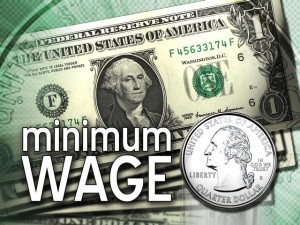By Holly Sklar
 (American Forum) Do you think a national poll of small business owners would show majority support for increasing the minimum wage? How about a poll in which the small business owners were predominately Republican?
(American Forum) Do you think a national poll of small business owners would show majority support for increasing the minimum wage? How about a poll in which the small business owners were predominately Republican?
Well, 67 percent of small business owners support increasing the federal minimum wage and adjusting it yearly to keep up with the cost of living, a new poll shows. Forty-six percent of respondents identified themselves as Republican, 35 percent as Democrat and 11 percent as independent. The nationally representative opinion survey of small business owners was conducted by Greenberg Quinlan Rosner Research and released by Small Business Majority.
Oft-heard claims that most small business owners oppose a minimum wage increase are wrong. Small business owners across the political spectrum believe a minimum wage increase would boost business and help the economy. They think it will help job growth, not hurt it.
Sixty-five percent of small business owners agree that “increasing the minimum wage will help the economy because the people with the lowest incomes are the most likely to spend any pay increases buying necessities they could not afford before, which will boost sales at businesses. This will increase the customer demand that businesses need to retain or hire more employees.”
Greater New York Chamber of Commerce CEO Mark Jaffe was not surprised the national poll found strong business support for increasing the minimum wage. “That’s what our members have told us,” he said. “It makes good economic sense. A minimum wage increase will boost the consumer demand that spurs businesses to hire and grow.”
Workers are also consumers. The minimum wage sets the floor under worker paychecks. Minimum wage increases have been so little and so late in recent decades that there’s been heavy erosion in the buying power of the minimum wage, and in worker wages up the ladder.
The federal minimum wage was last increased in 2009 to $7.25 an hour – just $15,080 a year for full-time workers. Today’s minimum wage workers are paid much less than their counterparts decades ago.
Adjusted for inflation to 2013 dollars, the minimum wage was $8.56 an hour way back in 1956. At its inflation-adjusted high point in 1968, the minimum wage was worth $10.70.
Contrary to conventional portrayal, the overwhelming majority of small businesses don’t have any employees earning minimum wage. The poll found that 85 percent of small business owners pay all their employees more than the minimum wage.
Minimum wage workers are more likely to work for big chains than small businesses.
Sixty-five percent of small business owners agree that “increasing the minimum wage would allow people to afford basic necessities and decrease the pressure on taxpayer-financed government assistance to make up for the low wages paid by some employers.”
Lew Prince, owner of Vintage Vinyl in St. Louis, Mo., made similar points in testimony to a U.S. Senate Health, Education, Labor and Pensions Committee hearing on minimum wage in March. Prince spotlighted the irresponsibility of big corporations paying wages so low that workers qualify for food stamps and Medicaid.
Citing the Missouri Healthnet Employer Report, Prince said, “In the first quarter of 2011 (the latest data available) Wal-Mart alone cost Missouri taxpayers $6,506,254 in Medicaid costs. McDonald’s cost $3,781,373.”
“It hurts our economy when big chain stores pay workers so little they have to work two jobs or rely on public assistance to scrape by,” says Melanie Beam, President of Capital District Local First, an independent business alliance in New York. “Full-time workers should be able to afford the basic necessities businesses are eager to sell and no business owner who pays a living wage should be undercut by competitors who do not. A higher minimum wage would level the playing field for small businesses and keep more dollars circulating in our local economy and our tax base.”
We can’t build a strong economy on a falling wage floor. The minimum wage would be over $10 if it had kept up with the rising cost of living since the 1960s instead of falling behind.
Most small business owners, like most Americans, want a minimum wage increase. Let’s get it done.




